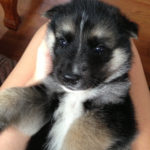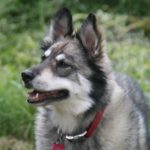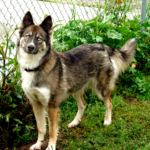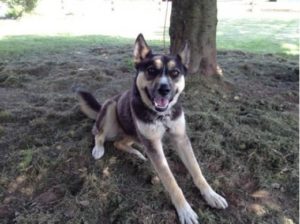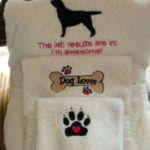Mix of
[dog_breed_widget id=168]
and
[dog_breed_widget id=305]
There’re a few mixed breeds that are just as good as their purebred parents. The hybrid of German Shepherd and Siberian Husky is one of those. The names that this cross is known by are Gerberian Shepsky and German Husky. Let me guide you through some info about this breed.
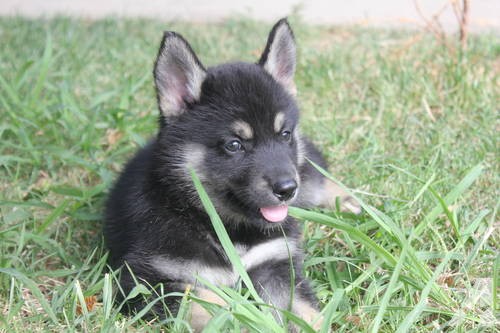
Top 5 facts about German Shepherd and Siberian Husky mix:
- The Shepsky, also known as the German Shepherd-Siberian Husky mix, is a crossbreed dog that combines the characteristics of both the German Shepherd and the Siberian Husky.
- These dogs are known for their intelligence, loyalty, and protective nature, making them great family pets and watchdogs.
- They have a thick, double coat that can come in a variety of colors, including black, gray, white, and brown.
- Shepskies are active and energetic dogs that require regular exercise and mental stimulation to keep them happy and healthy.
- They can be prone to certain health issues such as hip dysplasia, bloat, and eye problems, so it’s important to have regular vet check-ups and to maintain a healthy diet and exercise routine to help prevent these conditions.
Appearance
This crossbreed dog is quite big, usually, its height is between 20-25 inches and its weight is around 45-88 pounds. Most of the puppies inherit German Shepherd’s black and brown coat, but, as with all the mix breeds, it can go any combination of parental colors, from grey to red, and from sand to white. Usually, Shepsky has pointy ears, sometimes they get Husky bright blue eyes or in some cases, they have heterochromia (two eyes of different colors).
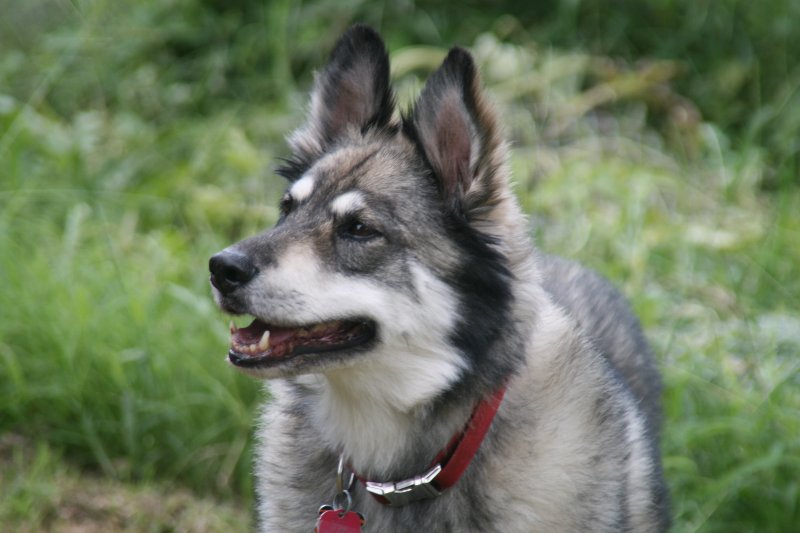
The coat of this dog is double-layered and sheds moderately. This makes Shepsky not good for adoption in families with fur allergies. It also makes them perfect for cold weather and living outdoors, but poses complications in warmer times.
Temperament of Shepsky
The temperament of a Shepsky can vary depending on the individual dog and its specific mix of traits inherited from its German Shepherd and Siberian Husky parents. However, in general, Shepskies are known for being intelligent, loyal, and protective.
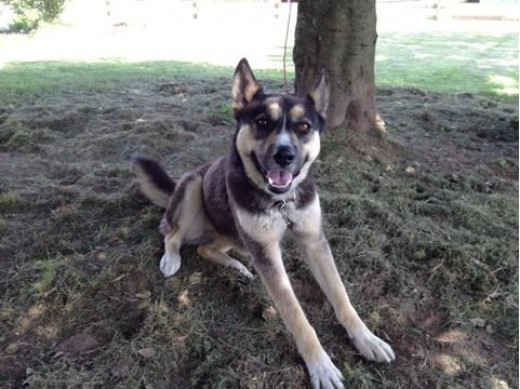
They are highly trainable and respond well to positive reinforcement-based training methods. They make great family pets and are good with children and other pets. They can be protective of their family, making them good watchdogs.
Shepskies are also known for being energetic, playful, and outgoing. They require regular exercise and mental stimulation to keep them happy and healthy. They can also be stubborn at times, so consistency and patience are important when training them.
Due to their intelligence and high energy, Shepskies can excel at various activities such as agility, obedience, and search and rescue.
It’s important to socialize them well from a young age to help them become well-adjusted, confident and well-behaved adult dogs.
Character and Training
Both parental breeds of Shepsky are highly intelligent working dogs. Siberian Husky was once bred for its power and endurance to pull a sled in the far north of Siberia. It’s a pack dog, a team worker, independent and energetic. German Shepherds changed many professions during their existence starting as Shepherd dogs and nowadays working with police and rescue teams all over the world. It’s famous for its intelligence, obedience, and social skills.
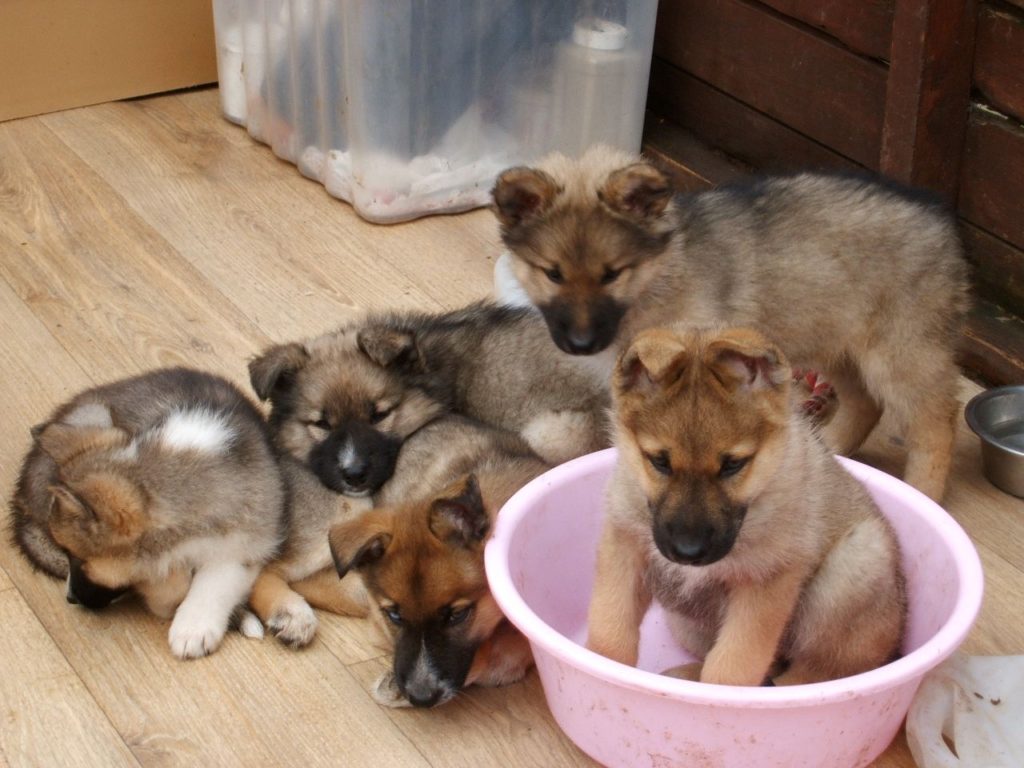
So what does this heritage make Shepsky? Well, it’s a very clever dog, that, with proper training will be an amazing companion and pet. It absolutely needs proper early socialization to be good with kids and other pets, otherwise, having moderate levels of aggression can be not a good match for small kids.
Exercise
Shepsky needs a lot of exercise to waste their endless energy. If you wish to avoid the destruction of your home – make sure the dog gets at least one good long walk during the day. Shepsky can be a nice guarding dog but might be annoying for the neighbors as it tends to be quite vocal and can even howl like a Husky if feeling lonely.
Life Span and Health
The average life span of Shepsky is between 10 to 13 years. They are usually quite healthy and like all the mixed breeds less likely to inherit classic parental breed health problems. Sill keeps an eye on the possibility of joint dysplasia, digestive issues, epilepsy, cancer, and blood disorders and makes an annual veterinary checkup a tradition.
Grooming German Shepherd and Siberian Husky mix
Shepskies have a thick, double coat that requires regular grooming to maintain its health and appearance. The exact grooming schedule will depend on your individual dog and its coat type, but generally, it is recommended to groom a Shepsky at least every 2-4 weeks.
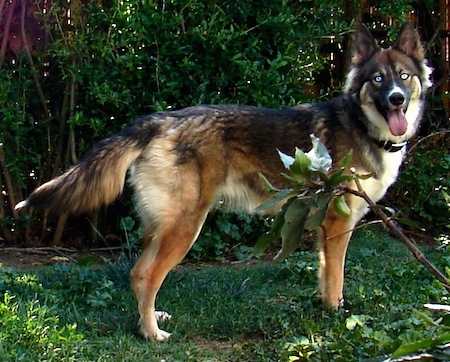
Here are some general grooming guidelines for a Shepsky:
- Brush their coat regularly: Shepskies have a thick, double coat that can shed heavily, especially during shedding seasons. Regular brushing (at least once a week) can help remove loose hair and prevent matting.
- Bathe your Shepsky as needed: Depending on their level of activity, Shepskies may need a bath every 4-6 weeks. Use a dog-specific shampoo to clean and condition their coat.
- Trim their nails: Overgrown nails can cause pain and discomfort for your Shepsky. Trim their nails as needed, usually every 4-6 weeks.
- Clean their ears: Shepskies are prone to ear infections, so it’s important to keep their ears clean. Use a damp cloth or cotton ball to wipe their ears clean, and check them for signs of redness or discharge.
- Brush their teeth: Regular teeth brushing can help prevent dental issues and bad breath.
It’s recommended to start grooming your Shepsky when they are puppies to get them used to the process and make it a positive experience for them. And if you’re not sure or don’t feel comfortable doing it yourself, you can always take them to a professional groomer.
Shepsky fits for apartment living?
Shepskies, as a large and energetic breed, may not be the best fit for apartment living. While they can adapt to living in smaller spaces, they require regular exercise and mental stimulation to keep them happy and healthy, and apartments typically do not provide the space needed to meet these needs.
Shepskies are active and energetic dogs that require daily walks and playtime to expend their energy. They also thrive with more physically demanding activities such as hiking, running, agility, and obedience training. These activities can be difficult to provide in an apartment setting.
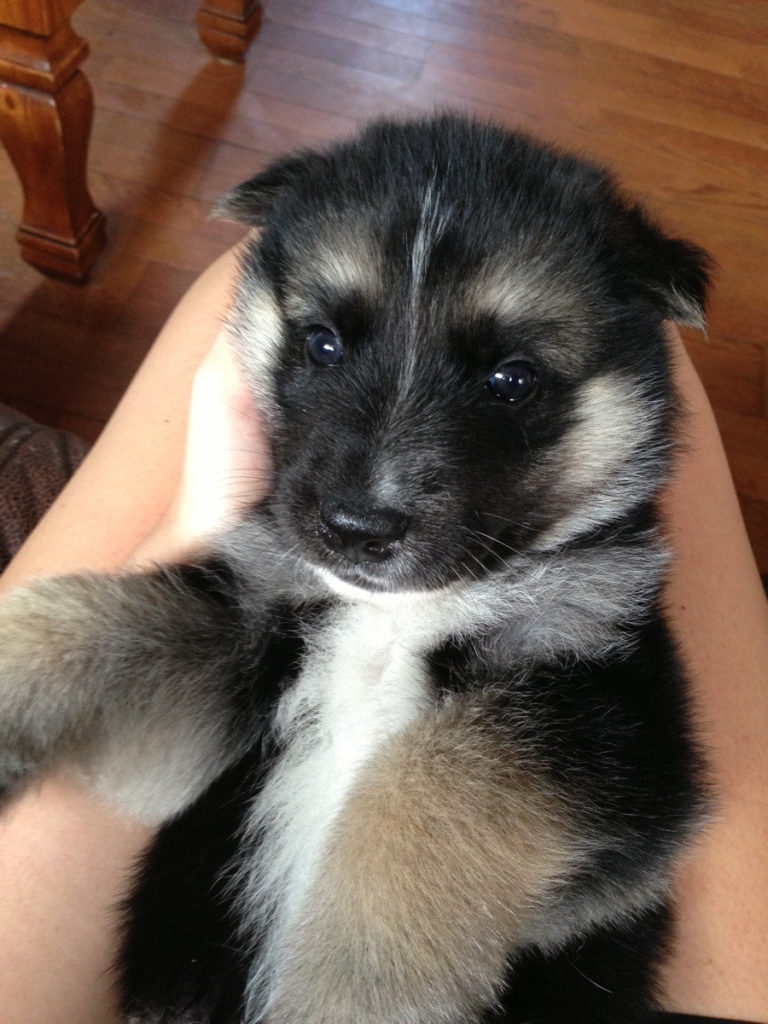
Additionally, Shepskies can be vocal, and their barking can be an issue for apartment living where other people live in close proximity.
If you live in an apartment and are considering a Shepsky, it’s important to be committed to providing them with the exercise and mental stimulation they need through regular walks trips to a dog park, or hiring a dog walker. And you should also be prepared for potential noise issues.
It’s not impossible for a Shepsky to live in an apartment, but it requires a lot of effort and dedication to ensure that they are getting the physical and mental stimulation they need.
What is the best food for Shepsky?
When it comes to feeding a Shepsky, it’s important to choose a high-quality, nutritionally balanced dog food that is appropriate for their size, activity level, and specific needs. Some good options for Shepskies include:
- Dry food: Dry kibble is a convenient and cost-effective option for Shepskies. Look for a food that is made with high-quality protein sources such as chicken, fish, or lamb, and is formulated for large breeds.
- Wet food: Wet food can be a good option for Shepskies, especially if they have a tendency to be picky eaters. Wet food is more palatable than dry food and can be a good source of hydration.
- Homemade food: Preparing homemade food for your Shepsky can be a great option if you want to have complete control over the ingredients and the quality of the food. Consult with a veterinarian or a pet nutritionist to ensure that the food you prepare is nutritionally balanced.
- Raw food: A raw food diet can be a good option for Shepskies, as it closely mimics their natural diet in the wild. Consult with a veterinarian or a pet nutritionist before starting a raw food diet for your Shepsky.
Regardless of the type of food you choose, it is important to select a high-quality, nutritionally complete food that is appropriate for your Shepsky’s life stage, size, and activity level.
It is also important to monitor your Shepsky’s weight and adjust the amount of food accordingly to prevent obesity, as Shepskies are prone to weight gain if they don’t get enough exercise.

